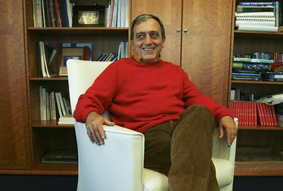
We saw him in newspapers with his comments about Sabancı University or current issues. We ran into him as he removed his tray in the cafeteria or rode his bicycle around the campus. He had never said anything about his childhood memories, games, punishments, and what it meant to be a child in the ‘40s and ‘50s.
In this issue, we talk to our president Tosun Terzioğlu.
When and where were you born?
I was born in 1942. We were living in Laleli, Istanbul. Koska Avenue, number 10. It was a very cold winter. My mother slipped and fell in front of the butcher’s, and I guess that is why I was born 10-15 days prematurely. Actually, that’s where my name comes from. I was so thin due to the premature birth that my father would jokingly say that I was transparent. My first name Ahmet was already decided. But since my father be-lieved that I would grow up to be a “tosun” (big and healthy new born baby), so I was called Tosun.
Where did you spend your childhood?
In Laleli, where my primary school was. The Koca Ragıp Paşa School. It’s still there. I was the only child. A good part of my childhood, especially the summers, was spent at the Turgutalp village of Manisa, where my mother’s family lived. I used to play games, fish in the nearby stream, and take my grandmother’s cows to the pasture.
Turkey was a much, much poorer country
What do you remember about being a child in the 1940s?
Turkey was a much, much poorer nation. For instance, we had a concept called playing out in the field. Later, I realized that the “field” was actually the ruins of a fire. A great house had burnt down and its plot was left wild. Some plots had walls and basements remaining. Poor people would live in those ruins; poverty was everywhere. There was a soup shop at the corner of the Koska Avenue. We don’t have that kind of soup shops anymore. Pilaf was a welcome addition to the menu, only in the 1950s. Istanbul was very poor and small. For example, there were picnic areas in Mecidiyeköy. In other words, you would say you were “going to the countryside” when you left for Mecidiyeköy. One of the first newspaper headlines I remember was “Bandits rob passengers at Hacı Osman”. Hacı Osman is the road that connects Büyükdere to Maslak today. If bandits were to attempt highway robbery today, they would immediately be flattened by cars. Turkey was very different back then. Life was much slower. The trip from Istanbul to Soma (Turgutalp was connected to the Soma township) would take a whole day. We would first go to Bandırma by ferryboat, and then take the train. Supposedly, the train was to cover the distance in 5 hours, but we would consider ourselves lucky if it did so in 6 hours. There was this uphill track outbound from Bandırma, where the engine would be stretched beyond its capacity. The train would slow down so much that teenagers would jump down, climb the nearby plum trees to gather some fruit, and then jump back on the train with ease.
You said you would play in the field. What games did you play?
Football, of course! With a small, plastic ball. It was hard because the field was never flat. Which team would attach downhill first was very important when choosing sides. We never did find out which side had the advantage. I think attacking uphill in the second half was harder. Apart from that, there was tip-cat. There was one other game that I loved: Puddles would form in the fields after rain. We would dig canals from one puddle to the other and watch the water flow, and sometimes throw things into the current. In other words, we played with mud. I say puddle, but they were pools of mud, nothing else. Our school had a garden, but it was strictly forbidden to play in there. We were once caught playing football when we were in the 4th grade. What’s worse, the teacher on duty was Ms. Fatma, my class teacher. Consequences were bad because she was the teacher in duty. We had plenty of punishments in school, and they did include bodily punishment.







